Vedanta has mines, refineries and factories in various states in India – including Odisha, Chhattisgarh, Tamil Nadu, Rajasthan and Goa – as well as in Zambia, Liberia, South Africa, Namibia, Australia and Ireland. The company is being opposed everywhere it operates for violations of law, pollution and human rights abuses. Some of these abuses are detailed below.
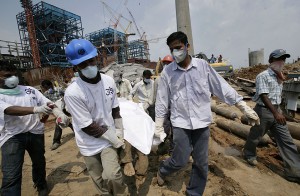 In Korba, Chhattisgarh, India between 40 and 100 workers died at Vedanta subsidiary BALCO’s aluminium smelter complex when a chimney under construction collapsed on them in September 2009. 42 deaths were officially registered, but at least 100 remain workers remain missing. The subsequent judicial inquiry into the incident found Vedanta guilty of negligence and using sub-standard materials and construction methods. However, Vedanta’s lawyers suppressed the report which was leaked by activists in 2014. Vedanta bought BALCO’s alumina refinery, smelter and bauxite mines from the Indian government for Rs 551.5 crores in 2001 when they were worth between Rs 3500 and Rs 5000 crores. 7000 workers opposed the sale by holding a landmark 61 day strike. Since privatisation work conditions have worsened – wages have been slashed, unionised workers are losing jobs in favour of contract labour and there are more accidents.
In Korba, Chhattisgarh, India between 40 and 100 workers died at Vedanta subsidiary BALCO’s aluminium smelter complex when a chimney under construction collapsed on them in September 2009. 42 deaths were officially registered, but at least 100 remain workers remain missing. The subsequent judicial inquiry into the incident found Vedanta guilty of negligence and using sub-standard materials and construction methods. However, Vedanta’s lawyers suppressed the report which was leaked by activists in 2014. Vedanta bought BALCO’s alumina refinery, smelter and bauxite mines from the Indian government for Rs 551.5 crores in 2001 when they were worth between Rs 3500 and Rs 5000 crores. 7000 workers opposed the sale by holding a landmark 61 day strike. Since privatisation work conditions have worsened – wages have been slashed, unionised workers are losing jobs in favour of contract labour and there are more accidents.
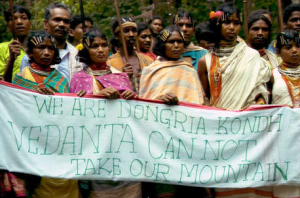 In Odisha, India a ten year struggle by indigenous communities and farmers led to a historic victory in 2014 when Vedanta was stopped from mining the sacred Niyamgiri hills for bauxite, following a precedent village referendum process, costing the company up to $10 billion in lost investment. Vedanta Aluminium Ltd had built the 1 million tonne Lanjigarh refinery at the base of the Niyamgiri hills in 2004, and even expanded it six fold, despite having no permission to mine bauxite from the hills above. Vedanta’s launch on the London Stock Exchange in 2003 was based on the impression given to financiers that they had permission to mine Niyamgiri.
In Odisha, India a ten year struggle by indigenous communities and farmers led to a historic victory in 2014 when Vedanta was stopped from mining the sacred Niyamgiri hills for bauxite, following a precedent village referendum process, costing the company up to $10 billion in lost investment. Vedanta Aluminium Ltd had built the 1 million tonne Lanjigarh refinery at the base of the Niyamgiri hills in 2004, and even expanded it six fold, despite having no permission to mine bauxite from the hills above. Vedanta’s launch on the London Stock Exchange in 2003 was based on the impression given to financiers that they had permission to mine Niyamgiri.
Despite the globally celebrated victory, Vedanta have not given up their attempts to mine the mountain. Many Dongria Kond (adivasi) activists have been murdered, tortured and harassed by police and State forces under the guise of ‘anti-terrorism’. Foil Vedanta is closely involved in this unique struggle.
In Zambia Vedanta bought subsidiary Konkola Copper Mines (KCM) from Anglo American in 2004 for just $25 million in cash. In the first three months of operation they had made profits of $26 million. The true valuation of KCM’s 79.4% share in the mines and factories is estimated at between $705 and $1460 million. Vedanta have long claimed that they are making a loss on Konkola Copper Mines and hence pay virtually no tax. In April 2014 a video released by Foil Vedanta showed Anil Agarwal bragging to the Jain International Trade Organisation in Bangalore that he was making between $500 million and $1 billion a year from KCM. Subsequent Zambian government investigations discovered how Vedanta was hiding its profits by ‘transfer pricing’ – selling copper vastly underpriced to its own subsidiary – Fujairah Gold in Dubai, run by Anil Agarwal’s son Agnivesh.
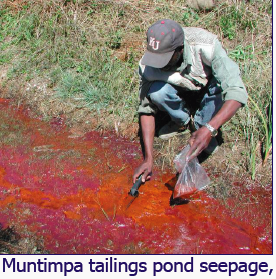
In 2006 KCM released pure acid and toxic mine waste into the river Kafue over several days, turning the river, which provides drinking water for 40,000 people, green, with 10x acceptable levels of copper, 770x manganese and 100x cobalt. Victims of the water pollution suffered kidney damage, miscarriages and other illness. 2000 people were awarded $2 million in damages by the Zambian High Court in 2011 but Vedanta appealed and the case was only heard in the Supreme Court as a result of activist pressure (including Foil Vedanta) in 2014 and ’15. The final judgement found Vedanta guilty but reduced the damages to close to nothing.
In 2015 a further 1,826 farmers took KCM and Vedanta to UK courts for continual and chronic pollution. In 2017 the Court of Appeal gave them permission to have their case heard in the UK, adding to important legal precedents on parent company accountability for foreign subsidiaries. Foil Vedanta have documented the shocking sickness, death and poverty caused by pollution in the communities. The fight goes on.
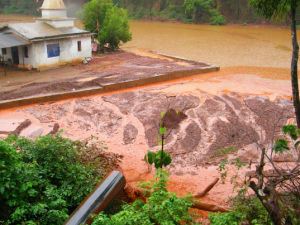 In Goa, India, Vedanta’s iron ore mining subsidiary Sesa Goa was the largest company indicted by the Shah Commission in 2012 for illegal mining, including failure to obtain leases or environmental clearance, and exporting exporting 150 million tonnes of iron ore from Goa in 2010/11 while only declaring 76 million, their agreed export allowance. In June 2009 a Sesa Goa pit wall collapsed drowning Advalpal village in toxic mine waste. Following the disaster 9 year old local boy Akaash Naik filed a petition to stop the mine and mass protests were held, successfully halting it later that year. Two more major mine waste floods occurred in Mulgao and Bicholim in 2011.
In Goa, India, Vedanta’s iron ore mining subsidiary Sesa Goa was the largest company indicted by the Shah Commission in 2012 for illegal mining, including failure to obtain leases or environmental clearance, and exporting exporting 150 million tonnes of iron ore from Goa in 2010/11 while only declaring 76 million, their agreed export allowance. In June 2009 a Sesa Goa pit wall collapsed drowning Advalpal village in toxic mine waste. Following the disaster 9 year old local boy Akaash Naik filed a petition to stop the mine and mass protests were held, successfully halting it later that year. Two more major mine waste floods occurred in Mulgao and Bicholim in 2011.
Vedanta Ltd, alongside Adani and Jindal (JSW Steel), are now planning a major extension to Mormugao Port, to enable millions of tonnes of imported coal to reach its power plant’s in Bellary, Karnataka.
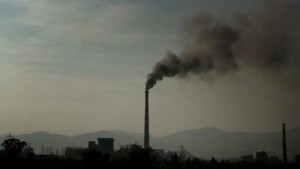 In Tuticorin, Tamil Nadu, India, Vedanta subsidiary Sterlite’s copper smelter has one of the worst records of all Vedanta’s projects. The second hand plant imported from Chile was turned down by four states before settling in Tamil Nadu. The plant’s Environmental Impact Assessment was a sham, and coastal regulations forbidding the location of industrial plant within 25km of the Gulf of Mannar biosphere reserve were flagrantly ignored. In 1997 a kiln exploded killing two, and maiming two other workers.
In Tuticorin, Tamil Nadu, India, Vedanta subsidiary Sterlite’s copper smelter has one of the worst records of all Vedanta’s projects. The second hand plant imported from Chile was turned down by four states before settling in Tamil Nadu. The plant’s Environmental Impact Assessment was a sham, and coastal regulations forbidding the location of industrial plant within 25km of the Gulf of Mannar biosphere reserve were flagrantly ignored. In 1997 a kiln exploded killing two, and maiming two other workers.
In 2013 a major leak of sulphur gas from the plant affected thousands in the town, leading to mass protests by local taxi and fishermens trade unions among others, and the temporary closure of the plant. Sixteen workers died at the plant between 2007 & 2011 and the fatality rate remains very high. Journalists and local people have reported on illegal waste dumps around the town, and investigations of port data revealed that Vedanta were using highly contaminated imported copper concentrates, producing 2.2 tonnes of uranium and 441 tonnes of arsenic between 2009 and 2010 alone.
In Rajasthan, India, Vedanta bought public company Hindustan Zinc Limited (HZL) for only 600 crore rupees (£64 million), using a valuation by BNP Paribas which is estimated to be more than 20 times too low. The true value of HZL is estimated to be 24,000 crore rupees (£2.5 billion). Vedanta are now attempting to buy the remaining 35% from the government, freeing up $4.6 billion of cash reserves which could be used to pay off Vedanta Group debts. Public Interest lawyers and local trade unions are fighting the illegal sell off of this national asset.
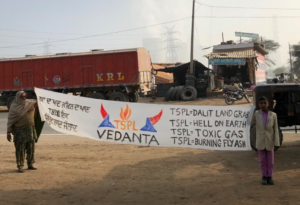 In Punjab, India, Vedanta subsidiary Talwandi Sabo Power Ltd (TSPL) is the subject of a major power purchase scam in which the Akali Dal government bought power at inflated prices from the private company over cheaper State owned companies.
In Punjab, India, Vedanta subsidiary Talwandi Sabo Power Ltd (TSPL) is the subject of a major power purchase scam in which the Akali Dal government bought power at inflated prices from the private company over cheaper State owned companies.
TSPL grabbed land for the plant without carrying out a public hearing or consultation with local people. Compensation paid to farmers was below market value as Talwindi Sabo Power Ltd claimed the land was barren when it was in fact fertile land with standing crops. Dalit and landless labourers received no compensation for their loss of livelihood and loss of access to Panchayati land. Ash from the plant rains down on local communities and crops causing respiratory problems, itching and burning eyes, rashes on the body and headaches, as well as serious diseases in cattle. Four labourers died in construction of the plant, and two more in 2015 while cleaning cooling towers.
The enormous coal fired power station emitted 53 million tonnes of carbon in 2016 according to Vedanta’s annual report.
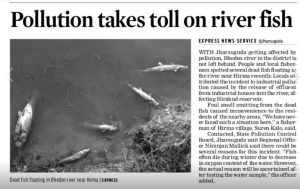 In Odisha, India, Vedanta Ltd’s enormous Jharsuguda aluminium complex, containing two smelters and power plants, was built in 2006 without a proper Environmental Impact Assessment, after a sham public hearing. The Bheden river is no longer potable as a result of continual pollution. In August 2017 the plant’s ash pond collapsed, flooding around 500 acres of farmland with toxic waste. Villagers locked the factory gate demanding compensation.
In Odisha, India, Vedanta Ltd’s enormous Jharsuguda aluminium complex, containing two smelters and power plants, was built in 2006 without a proper Environmental Impact Assessment, after a sham public hearing. The Bheden river is no longer potable as a result of continual pollution. In August 2017 the plant’s ash pond collapsed, flooding around 500 acres of farmland with toxic waste. Villagers locked the factory gate demanding compensation.
In Tasmania, Australia, Three workers were killed at subsidiary Copper Mines Tasmania Pty Ltd in 2014 in two separate incidents in which CMT were found to be negligent. The area has been plagued by acid drainage from Vedanta’s mine.
In Ireland, Vedanta acquired Anglo American’s Lisheen zinc mine in 2011. In 2014 three senior managers were granted six months sick pay as compensation after leaving the company due to ‘bullying, harassment and intimidation since Vedanta took control’. An email from a Vedanta executive even asked them “are you Irish or Jihadi?”.
Please see our resources page for leaflets, newsletters and reports published by Foil Vedanta.